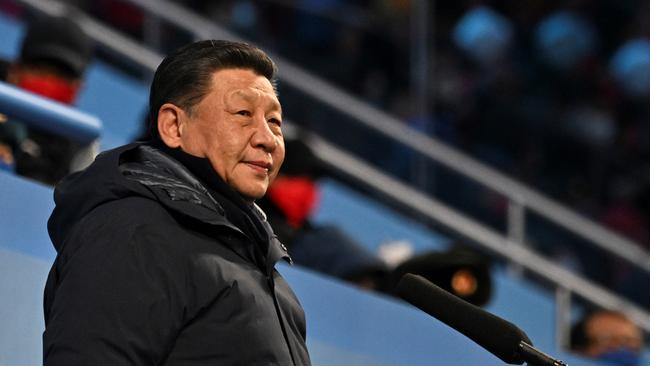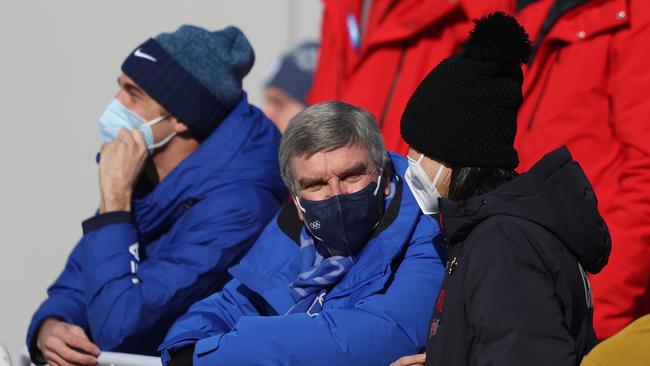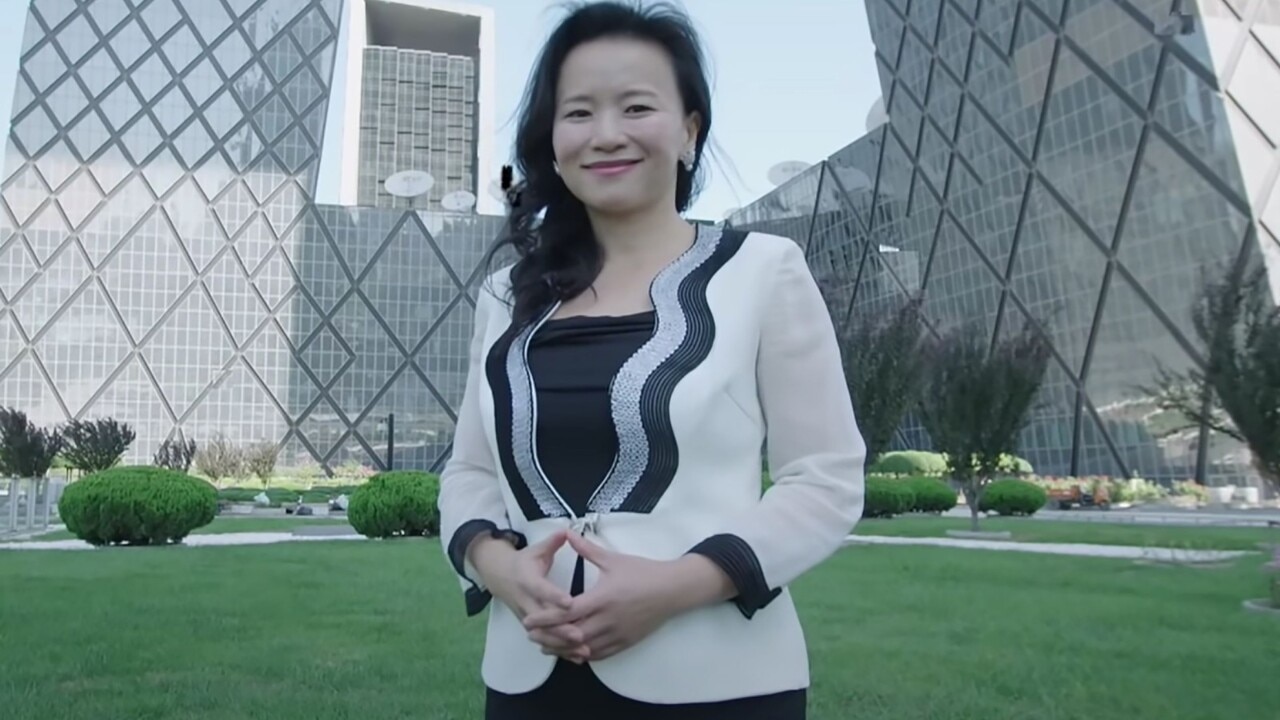Pride, prejudice and the Beijing Winter Olympics
National confidence is high, particularly among the young, inside the fanciful bubble.

The crowd at Beijing’s Bird’s Nest stadium roared. The Russians had arrived.
Chinese President Xi Jinping’s Olympics guest of honour – his good friend Vladimir Putin – gave a double thumbs up for the cameras.
No other visiting country’s athletes got anything like the eruption.
Inquirer was in China’s freezing national stadium watching the opening ceremony with an Olympics volunteer, a masters student at Beijing’s prestigious Renmin university.
For the first time in the evening, this highly articulate philosophy student struggled to find the right words when asked about Putin’s popularity with the local crowd.
Perhaps she sensed it was best not to tell the foreigner: “Because he sticks it to the Americans!”
Eventually, she said Chinese people liked Putin because he did his own thing, and wouldn’t be pushed around. “And because he’s very handsome,” she added.
The Beijing Winter Games “will definitely go down in history”, as Xi said recently. They are the most divisive since the collapse of the Soviet Union.
They began a week ago, with the most important of Xi’s VIPs threatening to launch the biggest military offensive in Europe since World War II.
Hours before their opening, Xi and Putin released a 6000-word statement that denounced AUKUS, railed at NATO and warned America and its allies to butt out of their two spheres of influence. It was a blueprint for a world “completely at odds” with the vision of Australia and its allies, said Foreign Affairs Minister Marise Payne.
Beijing – with exquisite irony – has chosen “Together for a shared future” as its slogan for the 2022 Games. Banners with the phrase hang over the giant, airport terminal-like media complex journalists are confined in when they are not fenced in their hotels or the cordoned Olympic venues.
The slogan is stamped on the Games’ merchandise, along with Beijing 2022’s two mascots: a fat panda and a chubby lantern. It is the name of the Games’ sugary pop anthem.

“Together for a shared future” is also a world view the Chinese Communist Party takes very seriously. It is a future where Hong Kongers pledge loyalty to the Motherland, as did the Mandarin-speaking flag bearer of the city’s Olympic delegation last Friday.
A future where Uighurs in China’s far west express gratefulness to Beijing, as did the hitherto unknown skier Beijing audaciously chose to light the Olympic torch at what human rights activists have dubbed the “Genocide Games”.
A future in which the world is safe for China’s Leninist political system.
And a future in which China demonstrates “what a resolute and bold great power looks like”, declared the party’s mouthpiece the People’s Daily this week.
“For the vast number of developing countries that have been bullied and oppressed by western powers, China is offering a rich and precious and brand-new ‘harmonious’ civilisation,” the party elite’s paper said.
The credit for it, as with all big ideas in China’s “New Era”, goes to General Secretary Xi.
To underline Xi’s leading role, Monday’s edition of the People’s Daily ran his picture six times on its front page: four stilted side-by-side photographs with his international guests on the right side of page one, another two stilted side-by-side photographs on the left side.
Even by the standards of propagandists in Xi’s reign, it was a megalomaniacal ensemble.
In further proof of the great leader’s foreign policy genius, China’s official news agency Xinhua lauded the banquet he held last Saturday in Beijing’s Great Hall of the People.
United Nations Secretary-General Antonio Guterres, Xinhua reported, toasted the “extraordinary and splendid” opening ceremony.
President of the International Olympic Committee Thomas Bach declared China’s leader a champion of the Games.
“VIPs one after another expressed their sincere appreciation to President Xi,” recorded Xinhua.
Among them were Xi’s peers on the world stage: the Grand Duke of Luxembourg, the President of Egypt, the Prime Minister of Mongolia, Argentina’s new president, the leaders of the five “Stans”.
The Prime Minister of Papua New Guinea, the guest of honour from Oceania, had to send his apologies; he had tested positive for Covid the day before after arriving in Beijing.
China’s vice-minister of foreign affairs said the number of guests – more than 20 – demonstrated the wide support of the international community.
“It also fully displayed the charm and charisma of Xi as a leader,” he added.
In much of the world outside China, these Winter Games have a profound image problem.
Inside the Olympics bubble, the mood is ecstatic.
“I feel so lucky,” a student at Beijing Foreign Studies University tells Inquirer, while helping journalists and sporting officials board buses outside the giant media centre.
Another says she transferred to Beijing from her native Shanghai two years ago to do her masters degree, just so she could be in the running for a highly competitive spot as an Olympics volunteer.
“I am a part of history,” she says in the medals plaza outside the Bird’s Nest.
Speaking to dozens and dozens of these volunteers – all students at elite Chinese universities – the confidence in China’s trajectory is palpable.
So is the huge gulf between how China sees itself, and how many outside see China.
Xinjiang comes up in a conversation with a finance student on the man-made slopes of Zhangjiakou, where the skiing events are being held.
The friendly 20 year old didn’t mention the region’s more than one million Uighurs who have been rotated through re-education camps. He was giving Inquirer skiing recommendations.
Xinjiang is a favourite spot for him and his older brother.
“The snow is natural,” he says.
He went to high school in Arizona, in America’s southwest, before returning for university.
“I missed China.”
What does he think of the diplomatic boycott of the Games by the country he used to live in?
“I don’t know about it,” he says, before changing to more comfortable terrain, such as the “magnificent” opening ceremony.
He watched it on a computer screen with another volunteer in the hotel room they are sharing during their more than three months in the bubble.
“It was better than Tokyo – that’s my opinion. Tokyo was very dark. I didn’t like it. This was much brighter.”
Yan Xuetong, dean of Tsinghua University’s international studies institute, recently observed that China’s Generation Z has a sense of “superiority and confidence”.
It was a striking observation by a respected foreign policy thinker not known for his liberal world view.

“[They] look at international affairs with a make-believe mindset, thinking it’s very easy for China to achieve its foreign policy goals,” Professor Yan said. “They think only China is just and innocent, while other countries, especially western countries, are evil and thus have natural hatred towards westerners.”
Inquirer has not seen any hatred inside the Beijing Olympics bubble. The volunteers could not be friendlier.
But their national confidence is everywhere – and it is reinforced constantly by a boosterish media that portrays everything as better in China.
The belief that this is China’s moment is part of what has made the American-born freestyle skier Eileen Gu – known as Gu Ailing in China – the Games’ most popular athlete here.
She is a pin-up athlete: an Ivy league student, a Vogue model and, as of this week, a gold medal winner. And better still, she chose to compete for China, not America.
For many of her 20-something fans, it is more proof that – right now – they live in the best of all possible countries.
Joyously they sung “March of the Volunteers”, China’s national anthem, at the medals plaza on the night Gu was awarded her gold medal.
“China can provide her a very good opportunity,” one of them told Inquirer at the ceremony. “China is getting stronger.”




To join the conversation, please log in. Don't have an account? Register
Join the conversation, you are commenting as Logout